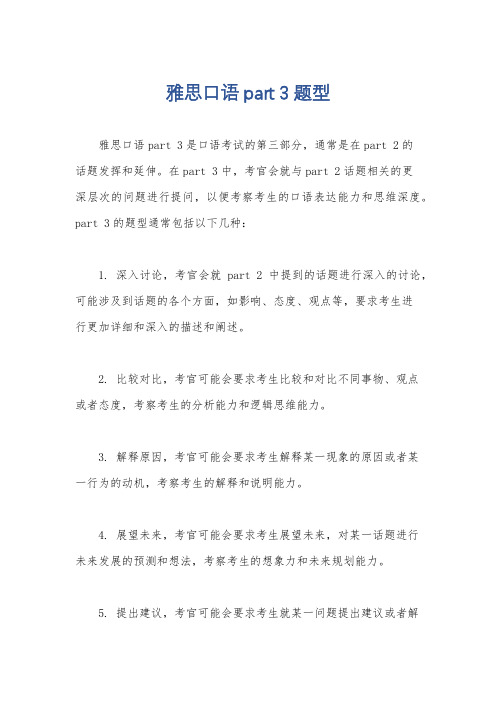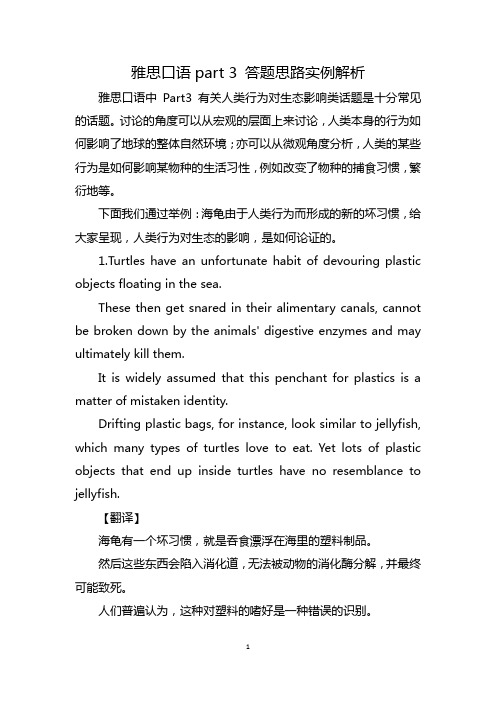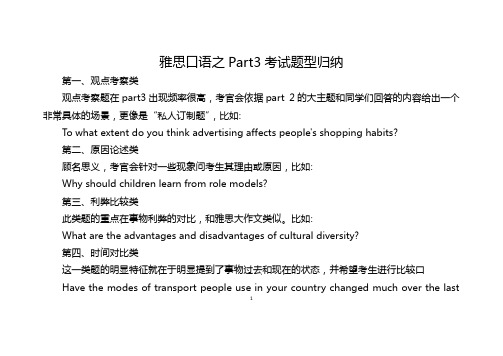Part 3 主要问题类型
雅思口语part 3题型

雅思口语part 3题型
雅思口语part 3是口语考试的第三部分,通常是在part 2的
话题发挥和延伸。
在part 3中,考官会就与part 2话题相关的更
深层次的问题进行提问,以便考察考生的口语表达能力和思维深度。
part 3的题型通常包括以下几种:
1. 深入讨论,考官会就part 2中提到的话题进行深入的讨论,可能涉及到话题的各个方面,如影响、态度、观点等,要求考生进
行更加详细和深入的描述和阐述。
2. 比较对比,考官可能会要求考生比较和对比不同事物、观点
或者态度,考察考生的分析能力和逻辑思维能力。
3. 解释原因,考官可能会要求考生解释某一现象的原因或者某
一行为的动机,考察考生的解释和说明能力。
4. 展望未来,考官可能会要求考生展望未来,对某一话题进行
未来发展的预测和想法,考察考生的想象力和未来规划能力。
5. 提出建议,考官可能会要求考生就某一问题提出建议或者解
决方案,考察考生的应变能力和解决问题的能力。
总的来说,雅思口语part 3的题型是比较开放和灵活的,考官
会根据part 2的话题和考生的回答情况来提出更深入和具体的问题,要求考生进行更加细致和深入的回答,以展现其口语表达能力和思
维深度。
考生在准备口语考试时,需要多加练习,提高自己的口语
表达能力和思维深度,以应对各种类型的part 3问题。
雅思口语考官范文Part3--和运动有关的3个问题及答

1. Why do you think sport is important?I think sport is important for different reasons. For me, doing a sport is about having fun. When I play football, for example, I forget about everything else and just enjoy myself. Also, doing a sport helps you to keep fit and healthy, and it's a good way to socialise and make friends.我认为体育是重要的,有很多原因。
对我来说,做运动是有乐趣的。
⽐如说,当我踢⾜球的时候,我忘记其它⼀切只是享受踢球的乐趣。
同时,做运动可以帮助你保持健康,⽽且这也是社交和交朋友的好⽅法。
2. Do you think famous sportspeople are good role models for children?I think that sportspeople should be good role models. Children look up to their favourite football players, like David Beckham for example, so I think that these people have an enormous responsibility. They should try to be a good influence, and behave in the right way.我认为运动员应该是好的榜样。
孩⼦们最喜欢的⾜球运动员,⽐如⼤卫贝克汉姆,我认为这些⼈有巨⼤的责任感。
雅思口语Part 3问题: 植物相关.doc

雅思口语Part 3问题: 植物相关
有个话题卡的考题是请考生描述一个很重要的植物或者你想种植的植物,那么今天我们来看一看考官会针对这个相关的话题卡问一系列的哪些问题呢?
Do people in your country like growing plants by themselves?
你们国家的人喜欢自己种一些植物吗?
Where do you people grow plants?
你们经常在哪里种些植物呢?
What do you think is the most important plant in your country?
你觉得哪种植物在你们国家算是最重要的?
What is the main plant in your country?
你们国家的主要植物是什么?
Do you want to be a farmer in the future?
你未来想成为一名农民吗?
What do you think of the farmer?
你觉得农民这个职业怎么样?
当然,这些题目还与话题卡的内容相连,比如要你描述你喜欢的植物()还比如要你回答回答你喜欢的蔬菜和水果()。
如果都能围绕植物有所准备,心里就不怕了。
雅思口语Part3详解

雅思口语Part3详解今天五月花留学将给各位烤鸭详细解析雅思口语Part3。
Part3是Part2的延伸,问题范围和Part2一致。
比起Part1的生活类问题,Part3的问题更有深度和广度,它的本质是讨论,此部分考察学生的辩证性思维以及论证能力。
Part 1:雅思口语Part3介绍Part2:雅思口语Part3答题关键Part3的问题答题时有2个很重要的原则,一是Speak at length,二是站在多个角度答问题。
1. 个人观点类问题此类问题大致如下:你认为…怎么样?你做过…吗?你认为…重要吗?一些人认为…,你同意吗?如果…你会怎么做?这类型的问题考察的是个人经验,对某个事物的看法,即描述某事某物的重要性/意议/价值等。
个人观点类问题答题时可以有三种角度:*No1. 正面出击。
(从正面阐述+举例。
)*No2. 反例法。
(从反面论证一件事物的重要性,即如果没有这个东西或者不做这件事会有什么不好的影响。
)*No3. 正+反结合。
(正面说一点,反面说一点)2. 差异对比类问题雅思口语Part3很喜欢问对比类的话题,可以细分为三大类:①事物对比答题可以有两种方式:*思路1:introduction(答案的开头句)+A的特点/优缺点+B的特点/优缺点+example(举一个具体的例子来解释A和B之间的差异)或者:*思路2:introduction+ A的特点/优缺点&example+ B的特点/优缺点&example+ reasons(具体解释一下产生A和B之间差异的原因)②人群对比答题:此类问题考察不同人群对待同一件事物或某种现象的看法,即你对二者人生观与态度的认知。
答题时需要站在不同的人物角度来作答:Introduction+For men...+From the women’s perspective ...+Conclusion.③时间对比答题:涉及时间类的问题主要考察事物的发展过程、发展趋势并未来展望(potential),答题时:有对比现象(如:以前的交流工具和现在的交流工具有什么不同?),两个时间段都描述,描述事物特征、样子;无对比现象,分点阐述,注意逻辑、时态。
雅思口语part 3 答题思路实例解析

雅思口语part 3 答题思路实例解析雅思口语中Part3有关人类行为对生态影响类话题是十分常见的话题。
讨论的角度可以从宏观的层面上来讨论,人类本身的行为如何影响了地球的整体自然环境;亦可以从微观角度分析,人类的某些行为是如何影响某物种的生活习性,例如改变了物种的捕食习惯,繁衍地等。
下面我们通过举例:海龟由于人类行为而形成的新的坏习惯,给大家呈现,人类行为对生态的影响,是如何论证的。
1.Turtles have an unfortunate habit of devouring plastic objects floating in the sea.These then get snared in their alimentary canals, cannot be broken down by the animals' digestive enzymes and may ultimately kill them.It is widely assumed that this penchant for plastics is a matter of mistaken identity.Drifting plastic bags, for instance, look similar to jellyfish, which many types of turtles love to eat. Yet lots of plastic objects that end up inside turtles have no resemblance to jellyfish.【翻译】海龟有一个坏习惯,就是吞食漂浮在海里的塑料制品。
然后这些东西会陷入消化道,无法被动物的消化酶分解,并最终可能致死。
人们普遍认为,这种对塑料的嗜好是一种错误的识别。
例如,漂浮的塑料袋看起来就像许多海龟喜欢吃的水母。
【思路】对于这类话题,我们首先可以阐述事实情况,然后展现出大多数人的一种普遍想法,最后通过科学的研究来展现出导致该事实发生的真实原因。
雅思口语之Part3考试题型归纳

雅思口语之Part3考试题型归纳第一、观点考察类观点考察题在part3出现频率很高,考官会依据part 2的大主题和同学们回答的内容给出一个非常具体的场景,更像是“私人订制题”,比如:To what extent do you think advertising affects people's shopping habits?第二、原因论述类顾名思义,考官会针对一些现象问考生其理由或原因,比如:Why should children learn from role models?第三、利弊比较类此类题的重点在事物利弊的对比,和雅思大作文类似。
比如:What are the advantages and disadvantages of cultural diversity?第四、时间对比类这一类题的明显特征就在于明显提到了事物过去和现在的状态,并希望考生进行比较口Have the modes of transport people use in your country changed much over the last1few decades?第五、情况对比类这种题目通常是两方的对比,比如两种不同场景的比较,或者是两类不同人群的比较!Are women more fashionable than men?第六、预测未来类这类题一般会要求考生对未来进行展望,用的时态也基本上都是未来时!Do you think online shopping will replace in-store shopping in the future?第七、解决问题类这类考题通常会要求考生对某些社会问题提出解决方案,比如:What can people do to reduce water pollution?第八、影响效果类这一类题目就会要求考生描述清楚事物的影响:How does modern technology influence friendship?2。
雅思口语5-8月 口语part3问题措施类
雅思口语5-8月口语part3问题措施类包含许多不同的话题,以下是一些示例问题及相应的回答:
1.如果要改进社区的环境,你有什么建议?
回答示例:我认为我们可以考虑绿化社区,比如在空地上种植更多的树木和花草,这样可以净化空气并美化环境。
此外,我们还可以设置更多的垃圾分类回收点,鼓励居民进行垃圾分类,减少对环境的污染。
2.如果要提高学生的学习效率,你有什么建议?
回答示例:我认为学习效率的提高需要从多个方面入手。
首先,学生应该合理安排学习时间,避免长时间连续学习导致的疲劳和注意力不集中。
其次,学生应该掌握科学的学习方法,比如分段学习、做笔记、复习等。
此外,学生还应该保持良好的生活习惯,比如保证充足的睡眠和适当的运动。
3.如果要减少城市的交通拥堵,你有什么建议?
回答示例:我认为可以采取以下措施来减少城市的交通拥堵。
首先,可以加强公共交通建设,比如增加公交线路、提高地铁覆盖率等,鼓励市民使用公共交通工具。
其次,可以实行错峰上下班制度,分散高峰时段的交通流量。
此外,可以优化道路交通信号灯,提高交通流畅度。
4.如果要促进旅游业的发展,你有什么建议?
回答示例:我认为旅游业的发展需要从多个方面入手。
首先,可以加强旅游基础设施建设,比如建设更多的酒店、景点和旅游设施等。
其次,可以推广旅游文化,提高旅游目的地的文化内涵和吸引力。
此外,
可以加强旅游安全保障,提高游客的旅游体验和满意度。
2023年雅思英语口语Part3常见话题关键词和句型整理
2023年雅思英语口语Part3常见话题关键词和句型整理雅思英语口语Part3常见话题关键词和句型雅思口语共分为3个部分,分别是一般话题问答、话题描述和双向深化争论。
Part3是对Part2的一个升华,主要考察同学的论证力量和临场反应力量,同时也测试同学在深化探讨主题时,能否保证英语各方面,特殊是发音和语法。
讨论雅思口语Part3的答题技巧及方法,不仅可以关心我们练好Part1,更能关心我们取得雅思口语高分。
下面是我为您收集整理的雅思英语口语Part3常见话题关键词和句型,供大家参考!雅思英语口语Part3常见话题关键词和句型(1)prefer关键问题Which one do you prefer, eating in a restaurant or at home?Do you prefer to travelling alone or with a lot of people?Which do you prefer, western wedding style or Chinese traditional one?关键句型To be honest, I prefer A to B for the reason thatIn my mind, I thinkis better, becauseTo tell you the truth, although B is, A is still better than B, because (2)benefit关键问题What are the benefits of swimming?关键句型The first benefit comes to my mind isPeople say, but for me,There are several benefits to name. Firstly, Secondly,Thirdly, (3)kind关键问题What kind of food do you like best?关键句型My favorite isIll say the one which earns my interest isMy answer would be(4)how关键问题How do you think we can control the terrible traffic condition?关键句型Before I explain, Id like you to imagine that you are a, and. Afterthis thinking, you might know how, right?There are a couple of ways to. In the first place, In addition,. Lastbut not least,This is really a big question for me. I think with the development of technology and society, the problem will be solved gradually.(5)advantages and disadvantages关键问题What are the advantages and disadvantages of watching TV program?关键句型The advantage is, while the disadvantage isOn one hand,. On the other hand,There are at least two advantages/disadvantages. For one thing,. Theother one is...(6)why关键问题Why is it important for us to give gifts to others?关键句型There are three reasons for that. To begin with,. In addition,. Lastly,.A couple of reasons may explain that. In the first place,. Whats more,. Last but not least,.There are several reasons for that. Firstly,. Secondly,.Thirdly.Well, the reasons for that are very simple. At first, .. Next,. Finally,.(7)what should people do to关键问题What should people do to minimize the damage of bad weather?关键句型We shouldThe first and foremost thing we should do isThe only way is(8)Tell me something about关键问题Tell me something about the tourism attraction which leaves you the deepest impression.关键句型If you like, I can show you around, and youll know why I like it so much.If you go there, you will receive a warm welcome.It may sound too general if I dont go into any detail.(9)difference关键问题What are the differences between Chinese food and western food?关键句型A is On the contrary,B isThere is a huge difference between A and B. A is, but B isA is. This is very different from B, which is(10)China关键问题What do Chinese people like to read?关键句型It depends. You know, China has a large population. For some people, . But othersWell, choices are divided. On one hand, A.. On the other hand, B.There is a difference in preference between A and B. While A is, B is .(11)choose关键问题Which one would you choose, living in a big city or a small countryside?关键句型I will give my support forI would vote forwill be my first choice.(12)characteristics关键问题What are the characteristics of good classmates?关键句型I think and may be the words to describe it.There are many characteristics. But the most distinctive one is关键问题Tell me something about the tourism attraction which leaves you the deepest impression.关键句型If you like, I can show you around, and youll know why I like it so much.If you go there, you will receive a warm welcome.It may sound too general if I dont go into any detail.(13)effect关键问题What are the effects of bad weather?关键句型It is helpful forIt is beneficial especially whenIt is harmful to(14)what do you think about关键问题What do you think about the life of the famous people?关键句型When I first think about, the first thing come to my mind is (15)would you like关键问题Would you like to be a singer?Would you like to be a movie star?Would you like to be a famous person?关键句型If I have the time, I would like to have a try, because I think it would be interesting and meaningful.I afraid no, because I dont care too much about.Absolutely. It is my childhood dream comes true.(16)do you often关键问题Do you often read books?Do you often go to restaurant?Do you often go to cinema?关键句型Yes. And I whenever I am free.No. I used to do that before, but now I drop it.No, because I dont have enough time to do that.以上,大致总结了雅思口语Part3可能考到的一些问题,盼望能关心广阔考生发觉雅思口语Part3的出题规律,并一一攻克其中的重点和难点。
雅思口语part3问题套路全讲解
雅思口语p a r t3问题套路全讲解(总3页)--本页仅作为文档封面,使用时请直接删除即可----内页可以根据需求调整合适字体及大小--不少同学在准备雅思口语的时候喜欢把重点都放在Part2上面,而Part3的问题往往是看一眼就过去了。
但实际上Part3的问题往往很抽象又难回答,更不可能像雅思口语Part 2一样有一份具体的题库,如果是毫无准备的情况下被问到,经常是卡壳而没有条理地胡说一通,前面的精心准备也大打了折扣。
今天就分享一下常见的雅思口语Part3问题规律,和一些答题的思路,以不变应万变。
Young vs. Old / Children vs. Adult很眼熟对不对没错,这就是套到任何一个话题都能用的神百搭问题。
并且可以幻化出无数个类似但不相同的问题来,比如:Do young people and oldpeople have different attitudes towards X What do you think young/oldpeople should do X Do you do X the same way when you were a child等等等等,总而言之就是想问随着年龄的增长,对某一个事物或者行为的看法或者做法有什么样的改变。
因为这个问题是可以放进任何一个语境里提问的,所以大家不要想当然的认为这其中就一定有差异,有的时候反而找不出任何差异,那也就诚实回答即可,不必牵强附会硬要找出什么区别来。
这个问题其实不难,套路就是先回答有没有差异,如果有就说说看,如果没有就说没有。
Chinese people大概是因为外国人自然就对中国感兴趣,很多话题里会出现What do Chinesepeople think of How do most Chinese people do X等等冠冕堂皇的问题,这种问题宏观又抽象,情急之下非常难回答的圆满,其实不论问题是什么,都可以这么回答——There is no way for me to know each Chinese’sopinion, but personally speaking, ..., 后接自己对这个话题的观点,很巧妙地就能避开宏观,从自己的观点出发,也不怕他后续接着提问了。
15个最奇葩的雅思口语part3问题
15个最奇葩的雅思口语part3问题雅思口语的part3通常被视为最难说的一部分,而且part3的好坏往往起到这样的作用——在考官犹豫该给你6.5还是7时,要不要给你加上这0.5分。
所以说,part3就是想要争取高分的烤鸭的必争之地。
这15个最奇葩的雅思口语part3问题雅思口语的part3通常被视为最难说的一部分,而且part3的好坏往往起到这样的作用——在考官犹豫该给你6.5还是7时,要不要给你加上这0.5分。
所以说,part3就是想要争取高分的烤鸭的必争之地。
不过,part3也以难度大、题目多、题目抽象而著名。
所谓的难度,很大一定程度包含考官常常不按常理不按套路所提的问题,于是就会有很多奇葩问题被考生吐槽——“excuseme?这怎么回答?二脸懵逼”。
其实,应对奇葩问题最好的办法就是一本正经的正常说话咯!个中奥义在何处,就在这篇文章里!我们下面就来看15道被誉为“最奇葩”的雅思口语题目。
1.学生用电子词典会导致他们犯错吗?说实话觉得用电子词典并不会有什么错呀...好吧,既然你诚心诚意地发问了,我就大慈大悲地想一想电子词典的性质、特点、平时和人的联系、平时应用的场景。
于是,有了!可以说excessive reliance, we will believe that all the explanations and usages in the dictionaryare right,Although e-dictionary brings convenience, it also contributes tothelack ofconsideration and innovation.还有一个稍微牵强点的理由就是会沉迷于电子产品…2.对人友好和对人礼貌的区别是什么???什么工作会经常假装友好?谁会经常对不喜欢的人友好? Whats the difference between pretend to befriendly and polite这题目真的是大写的黑人问号脸,friendly和polite在我的理解应该是亲疏的区别(其实口语考试就是这样,对任何问题没有绝对的对错,说你的看法,有道理即可),不管是陌生人还是亲近的人都应该有礼貌,亲近的人更应该用友好的态度,everyoneneed to be polite to anyoneelse, but don’t need to befriendly.接着可以用举例子展开,拉长说话的内容,比如:for example , i need to be friendly to..because ifeel..because i want he/shefeel..However...同时我还觉得每个工作都要假装友好啊,especially the serviceindustry. The more people we meetin a day, the more friendly we pretend to be.后面一个问题也是这样回答,也可以说情商高的人(people withhigh emotional intelligence)也会经常对不喜欢的人友好。
- 1、下载文档前请自行甄别文档内容的完整性,平台不提供额外的编辑、内容补充、找答案等附加服务。
- 2、"仅部分预览"的文档,不可在线预览部分如存在完整性等问题,可反馈申请退款(可完整预览的文档不适用该条件!)。
- 3、如文档侵犯您的权益,请联系客服反馈,我们会尽快为您处理(人工客服工作时间:9:00-18:30)。
Part 3 Main Question Types1. Basic information about part threeDuration: 4-5 minutesContent:One or Two main topics (sub-topics included)4-5 question items each2. General information about part three topics:(没有时间看真题,就从以下几个方面去准备,话题以part two 为主)The importance of this topic (you & society)Social phenomenon or controversial questionsThe role of governmentChanges (past and furture)Differences (old-young, male-female, rural-urban)Your personal feelings and opinions (大多数问题都会涉及个人观点)4. Question types:4.1. Comparing questions4.1.1. Comparing languages (红色字体标注,至少记住三个)a. Comparative adjectivese.g. Girls are more communicative than boys.Girls are friendlier than boys.b. Comparative adverbse.g. She takes part in the activities more frequently than the past.c. Using “more+noun.”e.g. girls spend more time texting or chatting on the phone than boys do.d. Using “more” to modify a verbe.g. Girls often argue much more often than boys.e. Using “similar (to)”e.g. They have similar clothes’ st yles.4.1.2 Contrast language (红色字体标注,至少记住三个)a. Using different (from)e.g. Girls are different from boys in term of hobbies.b. Using the coordinating conj. “but”e.g. Girls like conversation but boys like physical activities.c. Using linking words such as “however, on the one han d… on the other hand”e.g. Girls like gentle play; however, boys prefer rough play.On the one hand girls are often talkative; on the other hand,boys are frequently silent.d. Using subordinating conjunctions such as “while” and “whereas”e.g. Boys do physical things whereas/while girls like to gossip.4.1.3. 对比问题举例Do boys and girls have the same kind of friendships?I think that girls tend to have more intense and verbal relationships than boys do. Boys often bond by doing physical things together, whereas girls like to gossip, and spend more time texting or chatting on the phone than boys do. Girls also argue much more often than boys, and they frequently change their alliances while boys are less obsessed with their friends. (注:紫色字体为”比较类” 语言,蓝色字体为”对比类”语言)4.2. “Speculating” questions4.2.1. Guessing about the future“Speculating” language (至少记住三个相关表达)I imagine / suppose / guess ...... will + adverb (or, adverb + will) (adv.: probably, possibly)... be (present tense) likely to ...…may, might, could +base verbI expect/hope ...预测类问题举例:What future developments do you think we will see concerning zoos? Zoos will probably be developed in the following ways. One change might relate to the constructions of zoos, I mean, the animals’ houses or the surroundings, which could be designed more suitble for the animals to live in, and also much bigger than the present zoos. So that guarantee the animals have more freedom than they do now.4.2.2. Guessing something you don’t knowLanguage is more important than the content ( Don’t worry)a. One way to deal with the problem:Please relate the question to what you know, and what is happening in your country.e.g. What impact has the global recession had on environmental issues? Well, it’s difficult for me to comment on the worldwide situation, but I ca n say that here in Spain it has meant that for many people, environmental issues have become less pressing than everyday concerns such as paying the mortgage and keeping one’s job. In general I think that people are finding it difficult to address environmental issues as the solutions are often quite costly.b. Other ways to deal with the situation:拖延战术评价问题:“That is a very difficult/interesting/tricky… question…”说出想法:“Umm,... let me think about that.”让考官重复问题:You can ask the examiner, “Would you mind putting it in another way?”/“Excuse me, could you please rephrase XXX? ”额外补充:This is a bit tricky you know, because I don’t usually…,but let me see…I’m not quite sure about that, but from my own observation,…I’m not quite familiar with this, but let me guess…I think it depends, for people like me…, and for others…This is rather a big topic; so, let me first take myself as an example…4.3. “Evaluating”Questions以Do you think… / How do you think…/What do you think…/Why do you think…开头的问题, 或者以“What’s your opinion?”or “Would you agree or disagree?”结尾的问题。
“Evaluating” languages(至少要记住三个相关表达):1. In my view,…2. To be honest, I think...3. I’m not sure what I think about that…4. Well, on the whole, I tend to agree that…5. I think ...6. I believe ...7. I feel ...8. Personally, I (think, believe, feel) ...9. I tend to + (think, feel, believe) that ...10. In my opinion, ...11. I've always + (thought/believed/felt) that ...12. I definitely agree…13. I strongly feel…14. I firmly believe…15. I really believe…观点评估类问题举例Some people say that old buildings are an important part of history. Would you agree or disagree with this view?I would definitely agree with this view, because I think that old buildings are a reminder of important parts of history. Their materials, construction, style and even layout can help us to learn more about how previous generations lived in a way that museums and books cannot. So in my opinion, old buildings are almost like individual, living museums that everyone can enjoy, appreciate and learn from. I strongly feel that they should be preserved and protected for future generations.4.4. Problem questionsIdentify problems:There’re a lot of problems with XX.One major concern is…The biggest problem is…Most people believe that XX is the main problem 4.4.1. Language about causes and problems …is due to……is the result of…One of the main causes of this is…This is because…One reason for this is…4.4.2 Language about results or effects …leads to……causes……results in…Therefore…As a results,…4.4.3 Language about solutionsOne possible solution is to…A way of dealing with this is…This could be solved by…I'd .... (suggest, recommend, say, tell him/her/them) ....Maybe/perhaps/possibly ... + could / should ...It might/may help if ....+ past tense form of verbIt would probably + (be a good idea, be useful, help) if + past tense form of verb / I .... (suggest, recommend, say) ....“问题”类型题举例:What do you think are the main causes of lateness?I suppose it’s mainly caused by disorganisation and bad habits. But occasionally it is as a result of external factors which are beyond an individual’s control, such as a particularly bad traffic jam, or an unfortunate set of circumstances which have contributed to the lateness. However I think that persistent lateness is really just due to poor planning and personal organisation.“解决问题”类型题举例:What can be done about lateness?I think a potential solution obviously lies in gaining some time management skills, in addition to making a real effort to become organised such as using a diary, whether that’s online or even an old fashioned type diary. It’s amazing what a difference writing things in a diary can make! Another way of dealing with this is to use a mobile phone or blackberry type device to schedule your appointments, meetings and so on.5. 小结Three stages preparation in Part 3①熟悉题型,了解考官出题思路,掌握答题方式,熟悉框架。
